52 citations,
April 2008 in “Therapeutics and clinical risk management” The birth control combination of ethinylestradiol and drospirenone helps treat symptoms of polycystic ovary syndrome.
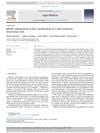 7 citations,
February 2021 in “Legal Medicine”
7 citations,
February 2021 in “Legal Medicine” Hair analysis showed very high metformin levels in two fatal overdose cases, suggesting it's useful in forensics but sweat may affect results.
 29 citations,
July 2010 in “Journal of Cutaneous Medicine and Surgery”
29 citations,
July 2010 in “Journal of Cutaneous Medicine and Surgery” Treatments for Frontal Fibrosing Alopecia have not been proven effective.
January 2023 in “Aesthetic Plastic Surgery” 
Solanum nigrum may help treat hair loss.
 19 citations,
January 2012 in “Dermato-endocrinology”
19 citations,
January 2012 in “Dermato-endocrinology” Moderately high prolactin levels do not cause hair loss in women.
 April 2014 in “Journal of Aesthetic Nursing”
April 2014 in “Journal of Aesthetic Nursing” Mesotherapy with natural extracts and vitamins can improve hair loss and promote regrowth in most women.
 25 citations,
January 2009 in “Oral and Maxillofacial Surgery Clinics of North America”
25 citations,
January 2009 in “Oral and Maxillofacial Surgery Clinics of North America” Successful hair transplant surgery depends on careful patient selection, proper surgical plan and technique, and attentive aftercare.
 2 citations,
January 2016 in “Springer eBooks”
2 citations,
January 2016 in “Springer eBooks” Fat tissue stem cells show promise for repairing different body tissues and are being tested in clinical trials.
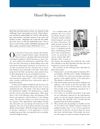 16 citations,
December 2004 in “Aesthetic surgery journal”
16 citations,
December 2004 in “Aesthetic surgery journal” The hand rejuvenation method makes hands look younger by improving skin and filling out tissues.
 April 2023 in “IntechOpen eBooks”
April 2023 in “IntechOpen eBooks” Neuropathic pruritus is a commonly overlooked and wrongly diagnosed type of chronic itching that is hard to treat.
September 2023 in “Pharmaceutics” The new face mask with Eflornithine can potentially reduce facial hair growth and moisturize skin.
 25 citations,
July 2021 in “Journal of Medical Virology”
25 citations,
July 2021 in “Journal of Medical Virology” COVID-19 can cause various skin issues, including rashes and hair loss, which usually heal on their own and don't always indicate severe illness.
 6 citations,
June 2021 in “Journal of health psychology”
6 citations,
June 2021 in “Journal of health psychology” The article suggests that the view of male baldness as a medical issue is influenced by commercial bias and calls for more unbiased research.
 10 citations,
January 2016 in “Dermatologic Clinics”
10 citations,
January 2016 in “Dermatologic Clinics” Some acne medications have side effects; doctors should educate patients and may not need to do frequent lab tests for all.
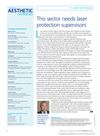 February 2018 in “Journal of Aesthetic Nursing”
February 2018 in “Journal of Aesthetic Nursing” Clinics using lasers should have trained laser safety supervisors to reduce accidents and possibly lower insurance costs.
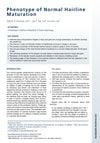 19 citations,
August 2013 in “Facial Plastic Surgery Clinics of North America”
19 citations,
August 2013 in “Facial Plastic Surgery Clinics of North America” Children's hairlines change shape as they grow, with women often developing a widow's peak and men's hairlines becoming more convex and possibly balding at the temples, influenced by genetics and hormones.
July 2017 in “Journal of the Dermatology Nurses’ Association” The convention highlighted knowledge sharing, networking, and the importance of active participation in dermatology.
 1 citations,
August 2021 in “International Journal of Dermatology”
1 citations,
August 2021 in “International Journal of Dermatology” The LGBT-focused curriculum improved dermatology residents' confidence in treating LGBT patients.
 1 citations,
December 2010 in “InnovAiT”
1 citations,
December 2010 in “InnovAiT” The document concludes that accurate diagnosis and appropriate management are crucial for treating various hair disorders, which have significant psychological impacts.
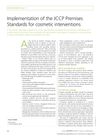 July 2019 in “Journal of Aesthetic Nursing”
July 2019 in “Journal of Aesthetic Nursing” The JCCP's Premises Standards aim to make non-surgical cosmetic treatments safer and higher quality.
 10 citations,
January 2018 in “Dermatology online journal”
10 citations,
January 2018 in “Dermatology online journal” Genital rejuvenation is becoming popular for improving genital appearance and function in both men and women.
 March 2001 in “International Journal of Cosmetic Surgery and Aesthetic Dermatology”
March 2001 in “International Journal of Cosmetic Surgery and Aesthetic Dermatology” The document covers books on cosmetic surgery and skin care, discussing legal and ethical issues, wound healing, the overlap of cosmetics and drugs, and detailed plastic surgery techniques.
 58 citations,
July 2007 in “Clinics in Dermatology”
58 citations,
July 2007 in “Clinics in Dermatology” Tattooing helps treat skin conditions, reconstruct nipple-areola, mark radiation fields, and locate lesions.
 August 2003 in “International Journal of Cosmetic Surgery and Aesthetic Dermatology”
August 2003 in “International Journal of Cosmetic Surgery and Aesthetic Dermatology” The document recommends the reviewed medical books for professionals in cosmetic surgery, dermatology, and genetics.
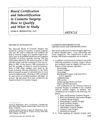 1 citations,
December 1989 in “The Journal of Dermatologic Surgery and Oncology”
1 citations,
December 1989 in “The Journal of Dermatologic Surgery and Oncology” To get certified in cosmetic surgery, doctors must pass exams and have specific experience; dermatologists are encouraged to get certified.
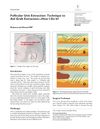 6 citations,
September 2017 in “The American Journal of Cosmetic Surgery”
6 citations,
September 2017 in “The American Journal of Cosmetic Surgery” Dr. Muhammad Ahmad's technique improves hair transplant success by increasing space between hairs and adjusting their angle to reduce damage and skin removal during extraction.
 February 2004 in “Plastic and Reconstructive Surgery”
February 2004 in “Plastic and Reconstructive Surgery” The book gives a basic overview of cosmetic surgery topics but lacks depth and innovation, especially in hair restoration.
 41 citations,
October 2000 in “Dermatologic clinics”
41 citations,
October 2000 in “Dermatologic clinics” Better hair care products are needed to protect against grooming and chemical damage.
 14 citations,
November 2018 in “Journal of Cosmetic Dermatology”
14 citations,
November 2018 in “Journal of Cosmetic Dermatology” PRP therapy safely improves hair growth in people with hair loss.

























